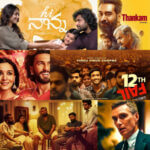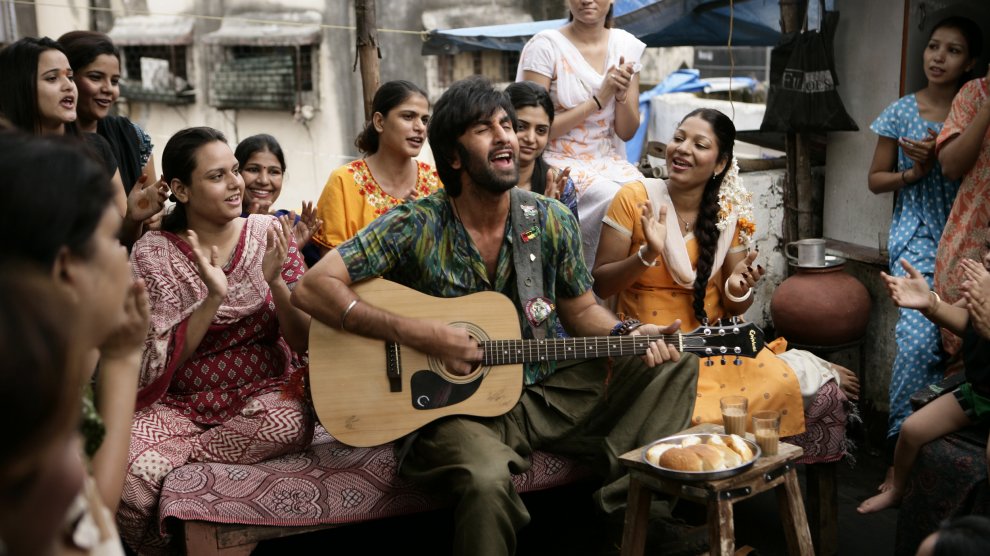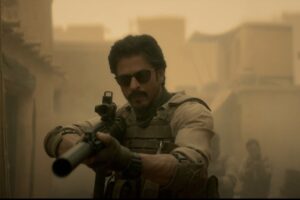‘Birds are sky bound; holding them down in a cage is wicked love.’
– Vincent Okay Nwachukwu
Janardan Jakhar is that bird. Imtiaz Ali imagined that bada jaanwar and penned it, not to make a movie, but perhaps to let the aspiring Jim Morrison from Pitampura speak his heart out, in a world that works on a different set of rules from his. This animal was yelling from different corners of Ali’s mind. Jakhar couldn’t have stayed inside for long. He is free-spirited, one who actually lives that identity of his, rather than preserving it for some motivational speech he would be paid for later because ‘that’s how it happens’.
And that’s why his story is the free-spirited too. Rockstar is all about Jordan. It is Jordan. I believe the entire movie is his life from his own thoughts and perspectives, like you’re reading his diary. And it’s our privilege that we got to see what goes on in the mind and heart of this heartbroken soul. For some, it may be a mess, for others, it resonates, and credit for both goes to the genius of Imtiaz Ali.
We see a successful, famous Jordan who is worshipped by his fans. People dress like him, sing his songs, and hoard in huge numbers to witness him perform live. This is him at his peak. He could sing anything and it would turn into gold. Even him playing a string at his guitar would cause the crowd to go gaga over him. One of the girls from the crowd faints simply because he looks back at her. He has a magnetic personality, more so because of the mystery that surrounds him.

And yet, minutes before this big concert, he’s engaged in a brawl. This is Jordan, more conscious of the world within him than that outside of him. The inner world is what he cares for too. It was as if Imtiaz showed us both the sides of his life, and then made us curious about the Jordan who is broken. What you are from outside is a reflection of the priority of your world inside. We are shown this famous rockstar and then suddenly, we are sent to the world Jordan lives in the most. It’s about his roots, his journey, his time and place when he could be closer and closer to his beloved Heer.
He wants us to see his life the way he thinks about it. It’s all about his perspective, isn’t it? It doesn’t matter if he is going to perform in Italy. It doesn’t matter if he has fans wanting to get a touch of him. It also doesn’t matter if he’s a sensation now. He wants us to see the lover he is. That’s him.
He knows he has to do something to be Jim Morrison. He can go to any lengths to be what he wants. He might have not realised it, but his fake chase for Heer was all about his true passion to be free. He didn’t want the family’s transport business. He would frown at the thought of doing anything else. He could never picture himself without a guitar in his hand. The desperation to reach at the top was far, far greater than his reputation in front of the girl and her friends. This craziness is what defines him, and for me, his status as an established singer is just a bonus.
When we are into Jordan’s mind, we must very well be aware that he has a different outlook of the world. While we decide we have to learn to adapt into unsuitable surroundings, he has no shame in showing that he won’t survive there. The uneasiness which later becomes so evident on his face and actions ‘returns’ after Heer leaves for Prague, making him feel the void now created. This uneasiness existed before her, and had subsided in her presence altogether.

Jordan, I believe, couldn’t think of a time when he didn’t feel out of place. The story of his that he wants us to follow begins from the spot where he’s at the bus stop singing what I feel could be his first and only song he’d written and composed by then. The song was about his discomfort in the world, and him always being misunderstood. It was about him failing to set himself according to the norms of the society he sadly found himself in. It was about his dreams, the way he looks at the world, and his quest to realize his own self. He named it Jo Bhi Main. It’s his own anthem, which would go on to be on everybody’s lips. It’s a preamble to his life. A perfect place to start the story.
His meeting with Heer, although it begins as something genuinely fake, develops over time when he learns she’s the same as him. Well, almost. Heer sees in him what she wants to be. He sees in her what he is, and what everybody else has failed to be. The only difference between the two is while Jordan is all about freedom, Heer tries to be that, but has given in to society. As she explains it to Jordan, she wants to live everything she won’t be allowed to, after she’s married. Jordan is the one who gets it. He’s the one she loves.
While Jordan talks about himself in Jo Bhi Main, Heer is expressed in the song Katiya Karun. Both these songs define the similar nature of the duo, but their own nature is different. While Heer’s song is a joyous one, talking about her flight away from the shackles that otherwise stay on her. It’s about feeling this liberation. On the other hand, Jordan’s song is a mixture of his dreams and his grievances. It throws light on his quest to find himself. Heer has no such quest, for she is someone who is, as they say, ‘sorted out’.

Like Jordan’s unpredictable nature, like his free attitude, his songs take a free verse, especially when he’s left to contemplate about his own self. And when the verses are not free, it’s the composition which is uneven. These reflect what lies in his subconscious. This is the same with Phir Se Ud Chala, where the song has no definite structure, just like the bird he envisions himself as in the lyrics. It just flows as the thoughts that occupy the mind of its singer. Aur Ho, which comes later in Jordan’s story, when he can’t keep on without Heer, goes through the same treatment. Everything that comes out from this mind has the nature of being free, or say distorted. While one can sense Heer’s frame of mind through the proper structure of Katiya Karun.
The same Jordan, when talks about his Heer in Hawaa Hawaa, carries that same distorted structure which is a part of him. The song is his ode to her, who has again broken the shackles and was out to enjoy her freedom with him. Jordan constantly feels he doesn’t belong to this world. To say it in a better way, the world makes him feel like that. The frustration of it all actually comes out in Sadda Haq, which is a direct attack on the system that tries to mould him into something which is not Jordan. He is not holding himself here. He is yelling. Be it his separation from Heer on a heartbreaking note, and the way everyone wants him to ‘behave’, he is dejected by everything.

That moment when Jordan was Janardan, and was thrown out of his home, he finds shelter at the shrine of Hazrat Nizamuddin Auliya, where he finds his own voice. That ‘thing’ that pain could give him, he had found it. And I feel he had also felt that this was the way he would sing, like a free bird, not caring about any particular structure, and if he did, his words would mean something we’re not used to hearing. Ustad Jameel Khan spots him at the shrine, soaring high in pain, and realizes this giant beast is not meant to be taken lightly. He can’t be tamed, and that’s his beauty. He is also seen feeling the angst of Jordan and sympathizing with him. Perhaps, he wished everyone would be like him who could understand people like Jordan and let them soar high in their own world. Perhaps all such Jordan wish for someone like Ustad Jameel Khan to vouch for them and say ‘ye aapke chhote pinjde mein nahi samayega, ye apni alag duniya banayega.’
A perfect demonstration of Jordan’s non-conformity comes during the recording sequence, where despite multiple takes, he fails to sing in the tune set by the composers. He has his own style of singing, which he has no control upon, and so he is rejected by them. What they don’t understand is that he isn’t designed in the way others are. He feels haunted by the world, and the only time he feels solace is when he’s with Heer, in their own world. It is this world that his devastated self thinks of in Nadaan Parindey. It is the world where his identity is that of a lover. An identity he can never escape. He longs to be reunited with his love.

He’s someone who sneaks away in the middle of an interview because he learns he has a chance to meet his beloved, and he wants to grab that opportunity. That’s more important for him than any interview that could make him the talk of the town. He’s someone who can leave just before he’s to perform because he learns of Heer’s deteriorating situation. He can also halt his dream of becoming Jim Morrison to go to Kashmir for Heer’s marriage. His unpredictability is echoed throughout in the structure of the movie as well. In one scene, we would see him on one of those stages where he is popular, then in the next scene, we will see Janardan, and not Jordan. It’s as if even the script is written by him, oscillating between different timelines, for that’s how things appear in his mind.
He’s a beautiful soul. At times, we’d find him sitting in a brothel, surrounded by sex-workers, singing ‘duniya ne humko diya kya, duniya se humne liya kya‘ with them. He would even come back from the airport only to say a proper bye to Heer. He laments, ‘main sirf tere saath hi set hoon, bas itni si baat hai‘, and that shows. Heer has talked about their own world, free of any limitations, anything that holds both of them back from being themselves. This world has no one from the outside interfering in their growth, in their love. All the shackles have been broken here.

And this takes me to two songs, Tum Ho and Tum Ko. Both these songs are the epilogues of every moment they have spent together. This song doesn’t belong to this world, but the world of Jordan and Heer, the world where everything is blissful. This is evident from the structure of this song, and the beats that are uniform in almost entire part of the song. This uniformity is the serenity of their souls, found in the place beyond the rightdoing and wrongdoing. That’s where everything is beautiful. Heer, the girl he dreamt to be with, is with him. All the pain of losing her, all the worries of living without her, are gone now. Jordan, in this part, has achieved everything his soul was yearning for.
He is finally at peace.
‘Tum bhi ho main, kya fikar ab humein‘
-Shahrukh Jamal















Add Comment